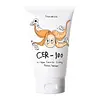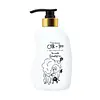What's inside
What's inside
 Key Ingredients
Key Ingredients

 Benefits
Benefits

 Concerns
Concerns

 Ingredients Side-by-side
Ingredients Side-by-side

Water
Skin ConditioningCetearyl Alcohol
EmollientBehentrimonium Chloride
PreservativeGlycerin
HumectantAmodimethicone
Cyclopentasiloxane
EmollientCitric Acid
BufferingIsopropyl Alcohol
SolventCetrimonium Chloride
AntimicrobialSodium Benzoate
MaskingDimethicone
EmollientTrideceth-12
EmulsifyingPanthenol
Skin ConditioningParfum
MaskingTocopheryl Acetate
AntioxidantCaramel
Cosmetic ColorantButylene Glycol
HumectantCornus Officinalis Fruit Extract
Skin ConditioningRehmannia Glutinosa Root Extract
Skin ConditioningDioscorea Japonica Root Extract
Skin ConditioningAlisma Orientale Tuber Extract
Skin ConditioningPaeonia Suffruticosa Root Extract
Skin ProtectingPoria Cocos Sclerotium Extract
AstringentCeramide NP
Skin ConditioningAlcohol
AntimicrobialHydrolyzed Silk
HumectantHydrolyzed Collagen
EmollientGelatin
Hydrolyzed Keratin
HumectantAvena Sativa Kernel Extract
Abrasive1,2-Hexanediol
Skin ConditioningHydrolyzed Wheat Protein
Skin ConditioningHydrolyzed Corn Protein
Skin ConditioningHydrolyzed Soy Protein
HumectantPhenoxyethanol
PreservativeDaucus Carota Sativa Root Extract
Skin ConditioningBrassica Oleracea Italica Extract
AstringentApium Graveolens Extract
Skin ConditioningSodium Dehydroacetate
PreservativeBrassica Oleracea Capitata Juice
Skin ConditioningOryza Sativa Extract
AbsorbentBrassica Rapa Leaf Extract
Skin ConditioningEthylhexylglycerin
Skin ConditioningSolanum Lycopersicum Fruit
EmollientIllicium Verum Fruit Extract
PerfumingCaprylyl Glycol
EmollientWater, Cetearyl Alcohol, Behentrimonium Chloride, Glycerin, Amodimethicone, Cyclopentasiloxane, Citric Acid, Isopropyl Alcohol, Cetrimonium Chloride, Sodium Benzoate, Dimethicone, Trideceth-12, Panthenol, Parfum, Tocopheryl Acetate, Caramel, Butylene Glycol, Cornus Officinalis Fruit Extract, Rehmannia Glutinosa Root Extract, Dioscorea Japonica Root Extract, Alisma Orientale Tuber Extract, Paeonia Suffruticosa Root Extract, Poria Cocos Sclerotium Extract, Ceramide NP, Alcohol, Hydrolyzed Silk, Hydrolyzed Collagen, Gelatin, Hydrolyzed Keratin, Avena Sativa Kernel Extract, 1,2-Hexanediol, Hydrolyzed Wheat Protein, Hydrolyzed Corn Protein, Hydrolyzed Soy Protein, Phenoxyethanol, Daucus Carota Sativa Root Extract, Brassica Oleracea Italica Extract, Apium Graveolens Extract, Sodium Dehydroacetate, Brassica Oleracea Capitata Juice, Oryza Sativa Extract, Brassica Rapa Leaf Extract, Ethylhexylglycerin, Solanum Lycopersicum Fruit, Illicium Verum Fruit Extract, Caprylyl Glycol
Water
Skin ConditioningSodium Lauryl Sulfate
CleansingCocamide DEA
EmulsifyingZinc Pyrithione
AntiseborrhoeicSodium Chloride
MaskingCocamidopropyl Betaine
CleansingSodium Benzoate
MaskingParfum
MaskingPolyquaternium-10
Menthol
MaskingHydrolyzed Collagen
EmollientPolyquaternium-7
Sodium Polynaphthalenesulfonate
Emulsion StabilisingButylene Glycol
HumectantNiacinamide
SmoothingMelaleuca Alternifolia Leaf Oil
AntioxidantPanthenol
Skin ConditioningBiotin
AntiseborrhoeicHouttuynia Cordata Extract
Skin ConditioningHydrolyzed Keratin
HumectantPanax Ginseng Root Extract
EmollientGelatin
1,2-Hexanediol
Skin ConditioningAvena Sativa Protein Extract
Skin ConditioningGinkgo Biloba Nut Extract
Skin ConditioningMorus Alba Fruit Extract
AntioxidantPunica Granatum Fruit Extract
AntioxidantFicus Carica Fruit Extract
HumectantOriganum Vulgare Extract
Skin ConditioningLavandula Angustifolia Flower Extract
CleansingThymus Vulgaris Flower/Leaf/Stem Extract
Skin ConditioningRosmarinus Officinalis Leaf Extract
AntimicrobialHydrolyzed Wheat Protein
Skin ConditioningHydrolyzed Corn Protein
Skin ConditioningHydrolyzed Soy Protein
HumectantCynanchum Atratum Extract
Skin ConditioningCamellia Japonica Leaf Extract
Skin ConditioningCeratonia Siliqua Fruit Extract
MaskingDiospyros Kaki Fruit Extract
Skin ConditioningCaprylyl Glycol
EmollientIllicium Verum Fruit Extract
PerfumingEthylhexylglycerin
Skin ConditioningWater, Sodium Lauryl Sulfate, Cocamide DEA, Zinc Pyrithione, Sodium Chloride, Cocamidopropyl Betaine, Sodium Benzoate, Parfum, Polyquaternium-10, Menthol, Hydrolyzed Collagen, Polyquaternium-7, Sodium Polynaphthalenesulfonate, Butylene Glycol, Niacinamide, Melaleuca Alternifolia Leaf Oil, Panthenol, Biotin, Houttuynia Cordata Extract, Hydrolyzed Keratin, Panax Ginseng Root Extract, Gelatin, 1,2-Hexanediol, Avena Sativa Protein Extract, Ginkgo Biloba Nut Extract, Morus Alba Fruit Extract, Punica Granatum Fruit Extract, Ficus Carica Fruit Extract, Origanum Vulgare Extract, Lavandula Angustifolia Flower Extract, Thymus Vulgaris Flower/Leaf/Stem Extract, Rosmarinus Officinalis Leaf Extract, Hydrolyzed Wheat Protein, Hydrolyzed Corn Protein, Hydrolyzed Soy Protein, Cynanchum Atratum Extract, Camellia Japonica Leaf Extract, Ceratonia Siliqua Fruit Extract, Diospyros Kaki Fruit Extract, Caprylyl Glycol, Illicium Verum Fruit Extract, Ethylhexylglycerin
 Reviews
Reviews

Ingredients Explained
These ingredients are found in both products.
Ingredients higher up in an ingredient list are typically present in a larger amount.
1,2-Hexanediol is a synthetic liquid and another multi-functional powerhouse.
It is a:
- Humectant, drawing moisture into the skin
- Emollient, helping to soften skin
- Solvent, dispersing and stabilizing formulas
- Preservative booster, enhancing the antimicrobial activity of other preservatives
Butylene Glycol (or BG) is used within cosmetic products for a few different reasons:
Overall, Butylene Glycol is a safe and well-rounded ingredient that works well with other ingredients.
Though this ingredient works well with most skin types, some people with sensitive skin may experience a reaction such as allergic rashes, closed comedones, or itchiness.
Learn more about Butylene GlycolCaprylyl Glycol is a humectant and emollient, meaning it attracts and preserves moisture.
It is a common ingredient in many products, especially those designed to hydrate skin. The primary benefits are retaining moisture, skin softening, and promoting a healthy skin barrier.
Though Caprylyl Glycol is an alcohol derived from fatty acids, it is not the kind that can dry out skin.
This ingredient is also used as a preservative to extend the life of products. It has slight antimicrobial properties.
Learn more about Caprylyl GlycolEthylhexylglycerin (we can't pronounce this either) is commonly used as a preservative and skin softener. It is derived from glyceryl.
You might see Ethylhexylglycerin often paired with other preservatives such as phenoxyethanol. Ethylhexylglycerin has been found to increase the effectiveness of these other preservatives.
We don't have a description for Gelatin yet.
Hydrolyzed collagen has a misleading name because it is actually a mixture of various proteins/peptides. This ingredient has skin hydrating properties.
Collagen is the most abundant type of structural protein found in your body. In your skin, it is responsible for keeping it firm and youthful.
Hydrolyzed Collagen is created by breaking up proteins into smaller peptide bonds. These peptides act as humectants and emollients.
Humectants are great at holding onto water, keeping skin hydrated. Emollients create a thin barrier on the skin to prevent moisture from escaping.
There is ongoing debate about whether hydrolyzed collagen works because it increases skin hydration. Skin hydration is also linked to elasticity and the appearance of wrinkles.
Collagen or peptide ingredients can be used in the morning or night. They will not increase sun sensitivity, but you should always wear sunscreen during the day.
According to a manufacturer, this ingredient is a great hair conditioner as well.
This ingredient can be extracted from different sources, including:
Vegan collagen is derived from yeast, bacteria, or plant sources. Vegan collagen would go by a different INCI name, such as hydrolyzed soy protein.
The results are varied.
A study from 2021 found hydrolyzed collagen increased elasticity and improved wrinkles in 1,125 participants between age 20 and 70. Another study found increased skin thickness in participants between the ages of 45 to 59.
However, It is difficult to prove that oral collagen will end up working on your skin. Many of the studies using hydrolyzed collagen also add several vitamins and nutrients into the test mixture as well.
Further studies are needed at this time.
Learn more about Hydrolyzed CollagenWe don't have a description for Hydrolyzed Corn Protein yet.
Hydrolyzed Keratin is derived from keratin. Keratin is a large protein that is naturally found in our hair and skin.
Studies show keratin is able to seal broken hair cuticles, helping to prevent split ends and breakage.
As a humectant, hydrolyzed keratin helps draw moisture from the air to your hair and skin. This helps keep your skin and hair hydrated.
Learn more about Hydrolyzed KeratinHydrolyzed Soy Protein is a vegan protein made to mimic hydrolyzed collagen. It is created from soy, or glycine soja.
This ingredient is a humectant, meaning it helps hydrate the skin by binding to water. According to a manufacturer, it is also a great hair conditioner.
Read more about hydrolyzed collagen here.
Learn more about Hydrolyzed Soy ProteinWe don't have a description for Hydrolyzed Wheat Protein yet.
Star anise extract is used to add a scent to a product. It has a similar smell to black licorice.
Panthenol is a common ingredient that helps hydrate and soothe the skin. It is found naturally in our skin and hair.
There are two forms of panthenol: D and L.
D-panthenol is also known as dexpanthenol. Most cosmetics use dexpanthenol or a mixture of D and L-panthenol.
Panthenol is famous due to its ability to go deeper into the skin's layers. Using this ingredient has numerous pros (and no cons):
Like hyaluronic acid, panthenol is a humectant. Humectants are able to bind and hold large amounts of water to keep skin hydrated.
This ingredient works well for wound healing. It works by increasing tissue in the wound and helps close open wounds.
Once oxidized, panthenol converts to pantothenic acid. Panthothenic acid is found in all living cells.
This ingredient is also referred to as pro-vitamin B5.
Learn more about PanthenolParfum is a catch-all term for an ingredient or more that is used to give a scent to products.
Also called "fragrance", this ingredient can be a blend of hundreds of chemicals or plant oils. This means every product with "fragrance" or "parfum" in the ingredients list is a different mixture.
For instance, Habanolide is a proprietary trade name for a specific aroma chemical. When used as a fragrance ingredient in cosmetics, most aroma chemicals fall under the broad labeling category of “FRAGRANCE” or “PARFUM” according to EU and US regulations.
The term 'parfum' or 'fragrance' is not regulated in many countries. In many cases, it is up to the brand to define this term.
For instance, many brands choose to label themselves as "fragrance-free" because they are not using synthetic fragrances. However, their products may still contain ingredients such as essential oils that are considered a fragrance by INCI standards.
One example is Calendula flower extract. Calendula is an essential oil that still imparts a scent or 'fragrance'.
Depending on the blend, the ingredients in the mixture can cause allergies and sensitivities on the skin. Some ingredients that are known EU allergens include linalool and citronellol.
Parfum can also be used to mask or cover an unpleasant scent.
The bottom line is: not all fragrances/parfum/ingredients are created equally. If you are worried about fragrances, we recommend taking a closer look at an ingredient. And of course, we always recommend speaking with a professional.
Learn more about ParfumSodium Benzoate is a preservative. It's used in both cosmetic and food products to inhibit the growth of mold and bacteria. It is typically produced synthetically.
Both the US FDA and EU Health Committee have approved the use of sodium benzoate. In the US, levels of 0.1% (of the total product) are allowed.
Sodium benzoate works as a preservative by inhibiting the growth of bacteria inside of cells. It prevents the cell from fermenting a type of sugar using an enzyme called phosphofructokinase.
It is the salt of benzoic acid. Foods containing sodium benzoate include soda, salad dressings, condiments, fruit juices, wines, and snack foods.
Studies for using ascorbic acid and sodium benzoate in cosmetics are lacking, especially in skincare routines with multiple steps.
We always recommend speaking with a professional, such as a dermatologist, if you have any concerns.
Learn more about Sodium BenzoateWater. It's the most common cosmetic ingredient of all. You'll usually see it at the top of ingredient lists, meaning that it makes up the largest part of the product.
So why is it so popular? Water most often acts as a solvent - this means that it helps dissolve other ingredients into the formulation.
You'll also recognize water as that liquid we all need to stay alive. If you see this, drink a glass of water. Stay hydrated!
Learn more about Water